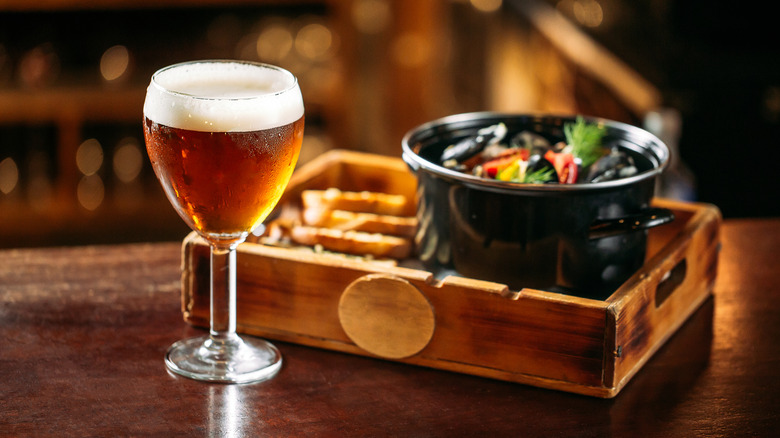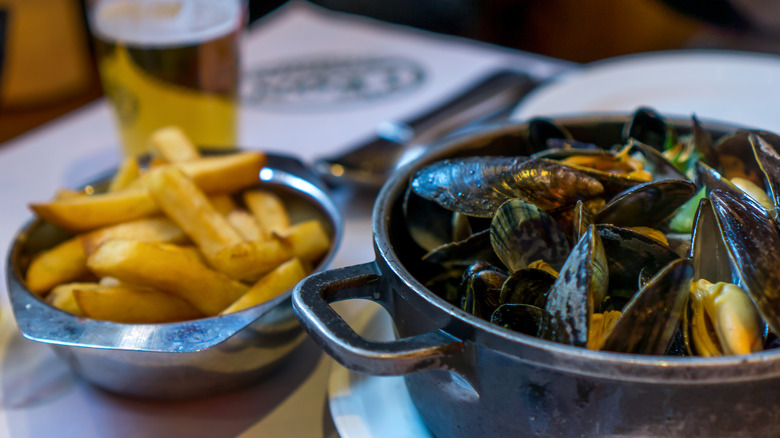What To Keep In Mind When Pairing Beer With Steamed Mussels
Steamed mussels — one of those dishes that just tastes better with an ice-cold beverage, especially a beer. While some prefer their mussels in a wine sauce, beer has often been used to steam these shellfish, mixed with aromatics like onion, garlic, leeks, or fennel. Beer also makes a perfect accompaniment for this simple yet comforting dish, serving as a light, refreshing foil to a meal that can otherwise be heavy with butter and other rich ingredients.
What beer goes best with mussels? That depends. There are tons of ways to tailor classic steamed mussels, from spicy curry sauces to tomatoey, garlicky dishes akin to cioppino. Different beers will pair well with different variations on the dish, but there are a few broad guidelines you can follow for a stellar combination every time.
For classic, no-frills mussel preparations using mild beers or white wines, pair with something equally light like a pilsner. For mussels with tomato-based sauces, pale ales are a fine pairing; this pairing also works well for dishes that contain chorizo, bacon, or other parts of the pig. Finally, if your mussels are spicy, a nice witbier or hefeweizen will help to cool things off.
Use similar or opposing flavors for a better pairing
A rule of thumb for pairing any beverage with any food is to go with one of two strategies: Either pair similar flavors together, or pair opposing flavors for contrast. Similar flavors meld together easily and don't fight one another on the palate. For contrasting flavors, think of how the acidity of lemon brightens up the heaviness of fried fish. The flavors offset each other and you end up with a more whole, complex final product.
With mild, simple mussel sauces, it's best to go with a beer that will mimic those mild flavors. Pilsners and lagers are both mild and pair well with anything, so they won't overpower the light flavor of the mussels.
For the deep umami of a tomato-based sauce, or one laced with savory bacon or chorizo, the contrast of an effervescent pale ale, especially a Belgian one, will pair beautifully. Pale ales are light, but they also have a bit of bitterness and bite to them which offsets the savory, salty flavors of the mussels.
And for spicy foods, a spice of a different kind helps to numb the bite. Witbiers and hefeweizens tend to have a spiced flavor that makes them unique. They also tend to be a bit sweet with citrusy or fruity, crisp notes that hit the spot after a bowl that makes you sweat.
Beer and mussels: a match made in Belgium
While you can find steamed mussels in all manner of places around the world, Belgium is often associated with mussels, as the classic dish moules-frites (mussels with beloved Belgian french fries) originated there and even serves as the country's national dish. The dish dates back to as early as the 1700s, when mussels were served humbly as a substitute for fish when there were shortages due to season or weather. At the time, mussels were inexpensive and plentiful; now the shellfish is in much higher demand and sells at a much higher price.
Belgium is also a land known for its beer. Belgian beers are a style all their own, and the beer culture in the country stems heavily from monks who would brew to provide beverages for themselves and for those visiting their abbeys. There are almost 1,500 styles of beer just in Belgium alone; for this reason, Belgium's beer culture has been listed as one of UNESCO's Intangible Cultural Heritages of Humanity.
With both beer and mussels so important to Belgium's culture, it's no wonder that they pair so naturally together!


